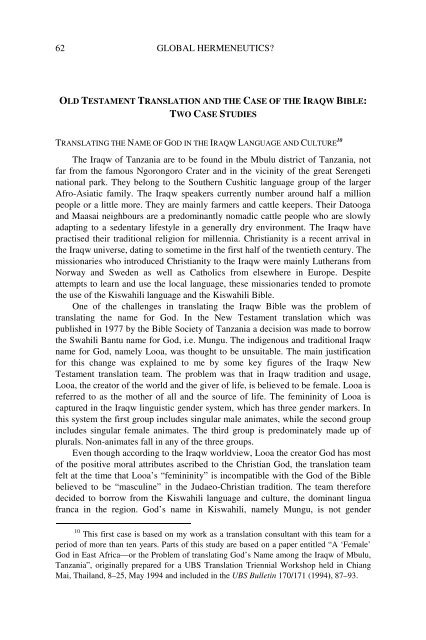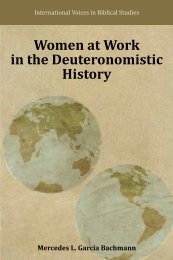Global Hermeneutics? - International Voices in Biblical Studies ...
Global Hermeneutics? - International Voices in Biblical Studies ...
Global Hermeneutics? - International Voices in Biblical Studies ...
Create successful ePaper yourself
Turn your PDF publications into a flip-book with our unique Google optimized e-Paper software.
62 GLOBAL HERMENEUTICS?<br />
OLD TESTAMENT TRANSLATION AND THE CASE OF THE IRAQW BIBLE:<br />
TWO CASE STUDIES<br />
TRANSLATING THE NAME OF GOD IN THE IRAQW LANGUAGE AND CULTURE 10<br />
The Iraqw of Tanzania are to be found <strong>in</strong> the Mbulu district of Tanzania, not<br />
far from the famous Ngorongoro Crater and <strong>in</strong> the vic<strong>in</strong>ity of the great Serengeti<br />
national park. They belong to the Southern Cushitic language group of the larger<br />
Afro-Asiatic family. The Iraqw speakers currently number around half a million<br />
people or a little more. They are ma<strong>in</strong>ly farmers and cattle keepers. Their Datooga<br />
and Maasai neighbours are a predom<strong>in</strong>antly nomadic cattle people who are slowly<br />
adapt<strong>in</strong>g to a sedentary lifestyle <strong>in</strong> a generally dry environment. The Iraqw have<br />
practised their traditional religion for millennia. Christianity is a recent arrival <strong>in</strong><br />
the Iraqw universe, dat<strong>in</strong>g to sometime <strong>in</strong> the first half of the twentieth century. The<br />
missionaries who <strong>in</strong>troduced Christianity to the Iraqw were ma<strong>in</strong>ly Lutherans from<br />
Norway and Sweden as well as Catholics from elsewhere <strong>in</strong> Europe. Despite<br />
attempts to learn and use the local language, these missionaries tended to promote<br />
the use of the Kiswahili language and the Kiswahili Bible.<br />
One of the challenges <strong>in</strong> translat<strong>in</strong>g the Iraqw Bible was the problem of<br />
translat<strong>in</strong>g the name for God. In the New Testament translation which was<br />
published <strong>in</strong> 1977 by the Bible Society of Tanzania a decision was made to borrow<br />
the Swahili Bantu name for God, i.e. Mungu. The <strong>in</strong>digenous and traditional Iraqw<br />
name for God, namely Looa, was thought to be unsuitable. The ma<strong>in</strong> justification<br />
for this change was expla<strong>in</strong>ed to me by some key figures of the Iraqw New<br />
Testament translation team. The problem was that <strong>in</strong> Iraqw tradition and usage,<br />
Looa, the creator of the world and the giver of life, is believed to be female. Looa is<br />
referred to as the mother of all and the source of life. The fem<strong>in</strong><strong>in</strong>ity of Looa is<br />
captured <strong>in</strong> the Iraqw l<strong>in</strong>guistic gender system, which has three gender markers. In<br />
this system the first group <strong>in</strong>cludes s<strong>in</strong>gular male animates, while the second group<br />
<strong>in</strong>cludes s<strong>in</strong>gular female animates. The third group is predom<strong>in</strong>ately made up of<br />
plurals. Non-animates fall <strong>in</strong> any of the three groups.<br />
Even though accord<strong>in</strong>g to the Iraqw worldview, Looa the creator God has most<br />
of the positive moral attributes ascribed to the Christian God, the translation team<br />
felt at the time that Looa’s “fem<strong>in</strong><strong>in</strong>ity” is <strong>in</strong>compatible with the God of the Bible<br />
believed to be “mascul<strong>in</strong>e” <strong>in</strong> the Judaeo-Christian tradition. The team therefore<br />
decided to borrow from the Kiswahili language and culture, the dom<strong>in</strong>ant l<strong>in</strong>gua<br />
franca <strong>in</strong> the region. God’s name <strong>in</strong> Kiswahili, namely Mungu, is not gender<br />
10 This first case is based on my work as a translation consultant with this team for a<br />
period of more than ten years. Parts of this study are based on a paper entitled “A ‘Female’<br />
God <strong>in</strong> East Africa—or the Problem of translat<strong>in</strong>g God’s Name among the Iraqw of Mbulu,<br />
Tanzania”, orig<strong>in</strong>ally prepared for a UBS Translation Triennial Workshop held <strong>in</strong> Chiang<br />
Mai, Thailand, 8–25, May 1994 and <strong>in</strong>cluded <strong>in</strong> the UBS Bullet<strong>in</strong> 170/171 (1994), 87–93.




